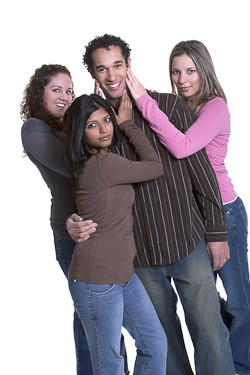
Actually, before I really get into it, perhaps I should explain for any new readers what I mean by “third” and what I mean by “secondary”. I should also note that my definitions will not be everyone’s. Every label or descriptor has a story behind it which can only be told by the person being described, and nowhere is this truer than in non-monogamy. So for me, being a “third” simply means I am the addition to a couple. Molly and Michael are the couple, and I am their third. That’s a fairly simple numbers game. As for “secondary,” well it’s actually not a term D and I use, so I won’t claim this to be “our” descriptor, but for the sake of this article I am claiming it. D is married, but I am not involved with her, only with him. Therefore I am not an addition to their couple; not a third. Instead I am more like D’s secondary partner (his wife being his primary partner). Of course it is possible to have more than one primary partner, or secondary partner, or tertiary partner, etc., and I am aware that many people dislike hierarchical relationship structures altogether, but for the sake of this article I think “secondary” is an appropriate term.
So onto the hardships of these dynamics and the vulnerable position of being (for lack of a better phrase) “in addition” to an existing relationship. Not that I wish to complain actually. It’s more a matter of facts than sorrows. For example, as a third or a secondary, I don’t merit the same level of consideration as a primary/core partner. That’s not to say I’m not considered, but just that I don’t come first. Which, by the by, has benefits too: while there is a part of me that longs to be a primary, to be right there all the time, there is also a part of me that is relieved not to have the same level of responsibility. For the most part, in my position, I am only responsible for me. I will take responsibility for “us” when it’s appropriate, but mostly it’s me.
Along these lines there is also a certain level of relief in knowing that the relationships I have become part of and/or sit alongside are getting the attention and focus they need to remain strong. As much as I love my partners, I’m not sure I’m in a stable enough position myself to be the one who holds it all together. I am very grateful for the existing structures and am happy to know that they are being maintained.
But okay, I’ll be honest: it absolutely is hard to come home to a quiet, dark house after another sixteen hour day and have to gather the strength to put a load of laundry on, to make sure things are ready for the next day, to pack work bags and even do some studying. That can be extremely difficult, and often I do wish with all my heart that when I finally climbed into bed, I wasn’t doing so alone. What I wouldn’t give to have arms around me, and a loving voice whispering support and affection to me. In those moments of truly being alone and vulnerable and over-exhausted, I will openly admit that knowing I am no-one’s priority can be hard to bear. But even that is over-dramatic: it’s not like I lie in bed going “no one cares about me!”; it’s just something that takes strength to understand and accept.
Having said all this, I will add – keeping in mind that writing a column about my personal relationships can actually impact those relationships – that in fact all my partners are thankfully very considerate and supportive of me, and this piece is, truly, more contemplation that complaint.

